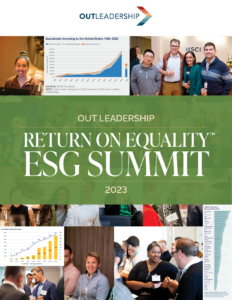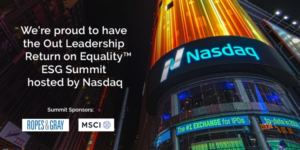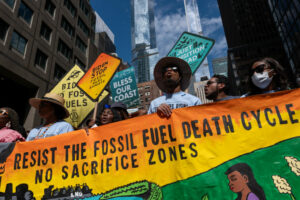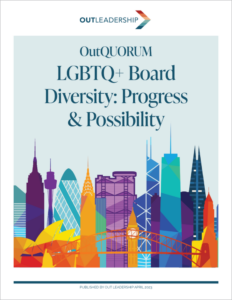
Making a persuasive, fact-based argument in the public sphere is challenging enough. But when those who disagree with you refuse to tell the truth (usually while screaming into a virtual megaphone), it’s nearly impossible. Nearly impossible.
Luckily, Out Leadership has been making just such an argument for more than a decade. And we’re far from alone. When we started Return on Equality™ 12 years ago – becoming the first and only company to measure LGBTQ+ equality as a business imperative – we joined dozens of companies that were already evaluating ways to maximize returns, mitigate risks, and create business opportunities by analyzing environmental, social, and governance (ESG)-related issues.

In recent months, ESG has come under attack from a small, but vocal minority determined to use contrived outrage and outsized influence to peddle falsehoods. Namely, that ESG is thinly disguised “wokeism”, a tool of the left to bankrupt not just businesses but also our country’s morality. They proselytize from “news” desks, social media platforms, and bully pulpits (they can even be found sounding off on the floor of the United States House of Representatives), predicting that ESG will bring the end of capitalism, masculinity, and Apple Pie.
Predictably the ones screaming the loudest are the ones least interested in telling the truth.

Pictured above: The Out Leadership Europe Summit ESG Dinner hosted by Reed Smith
So, here’s some truth: companies that invest in the well-being of their workers, the fair and equitable governance of their business, and care for their communities (aka ESG), will benefit from happier employees, better management, and more satisfied consumers.
And a little bit more: Out Leadership will never stop making the case for ESG and for LGBTQ+ inclusion in ESG metrics. We won’t be deterred by the strategic distractions of a handful of agitators with little business sense. Rather, we will continue to neutralize their misinformation campaign in reputable media outlets, on television, and yes, even in Congress (we already have!). And while we’re on the frontlines, dismantling their specious claims one argument at a time, we’ll also be partnering with businesses around the world to continue strengthening their commitment to ESG. To date, we’ve convened ESG professionals across four continents at ten meetings with 75 of the world’s top companies. In addition, we’ve hosted ESG Salon dinners twice in New York City and once each in London and Sydney.
We hope you’ll join many of those leaders at our upcoming Return on Equality™ Summit, where we will introduce metrics, reporting standards, and potential targets that leaders can use to produce a consolidated ESG framework that embeds LGBTQ+-inclusive diversity, equity, and inclusion. Together, we will discover the next best steps to continue driving LGBTQ+ advocacy, inform regulation, and improve business practices.
We couldn’t be more excited to be convening at the Nasdaq MarkeSite with our host – and deeply committed ESG thought and policy partner – Nasdaq. The Summit is also made possible by our prestigious sponsors Ropes & Gray and MSCI and is designed and led by our in-house ESG expert and Senior Advisor, former J.P. Morgan Managing Director Ken Janssens. The program will feature a roster of stellar business and thought leaders including New York City Comptroller Brad Lander (featured speaker at the VIP Reception); Rachel Hodgdon, CEO and President, IWBI; Bob McCormick, Managing Director, PJT Camberview; Jonas Kron, Chief Advocacy Officer, Trillium; Drew Murphy, CEO, Edison Energy; Karl Racine, former Attorney General of the District of Columbia and Partner at Hogan Lovells; Eric Behl-Remijan, Partner, Ropes & Gray; and Randall Hopkins, Global Head of Nasdaq ESG Solutions Vice President, Nasdaq.
The Summit features leaders – like you – who understand that organizing capital around conscience is a win for profit margins and a win for progress. Come ready for intelligent, provocative, and solutions-focused conversations. And you won’t need a megaphone, because we’ll be trafficking in the truth.
Sincerely,
Todd Sears
Founder & CEO
Out Leadership
Register for the upcoming Return on Equality™ ESG Summit hosted by Nasdaq below.

Here’s what you need to know this week…
#1
ESG is here to stay, and its presence is only growing.
Investors are directing their capital with a conscience, recognizing the long-term value of good governance, environmental stewardship, and social progress. The number and value of ETFs based on ESG Indexes from Out Leadership Member Firm MSCI have grown precipitously.


Research from Out Leadership member firm PwC shows that within the asset and wealth management industry, ESG-oriented funds could reach $47.6 trillion by 2026. PwC also found that 81% of institutional investors in the United States and 83.6% in Europe plan to increase their allocations to ESG products in the next two years.
Demand for ESG is even outstripping supply. Some 30% of investors say they are struggling to find adequate ESG investment opportunities and 88% believe asset managers should be more proactive in developing ESG products.
Evidence also demonstrates that ESG investments outperform the market. The S&P 500 ESG Index outperformed its benchmark, the S&P 500, by a cumulative 9.16% from its launch four years ago through the end of 2022, mostly by avoiding the low performance of the lowest-ESG scoring components of the fund. ESG investors also enjoy lower costs of capital and better access to debt due to their lower risk.

According to PwC, 60% of institutional investors have reported that ESG investing has resulted in higher performance yields and 78% said they would be willing to pay higher fees for ESG funds due to the prospect of higher returns. As these ESG-related risks become more pronounced, the upside to businesses with longstanding ESG initiatives could be monumental.
#2
ESG-related risks are becoming more material.

Pictured above: Out Leadership’s OutQUORUM Summit Board Fit Workshop hosted by KPMG.
ESG approaches to management and investing are becoming ever more urgent as their component factors grow more and more relevant.
- As our economy enters new frontiers – from crypto to virtual reality to artificial intelligence – good governance will become increasingly valuable. Mindful of recent cases of corporate mismanagement such as WeWork and FTX, accountability and oversight are paramount to investors, which can be achieved with more diverse governance. Out Leadership’s OutQUORUM initiative is addressing this need head-on.
-
An increasingly diverse workforce, including record numbers of LGBTQ+ leaders, are entering the workforce and assuming leadership roles at the world’s largest companies.
-
An increasingly globalized society exposes multinational companies to the social impact of their global supply chains. As international trade intensifies and emerging economies become wealthier, companies will be more liable for their exposure to human and civil rights issues abroad.
-
Climate change now threatens trillions of dollars in economic disruption per year. The National Oceanic and Atmospheric Administration (NOAA) estimated that in 2022, the cost of climate and weather disasters totaled more than $165 billion. Deloitte estimated that climate change could cost the global economy $178 trillion over the next 50 years unless a systemic, net-zero climate transition occurs.
To stay ahead of the curve, companies must begin actively evaluating and implementing ESG strategies to equip their workforces for success in the future.
#3
New generations demand ESG initiatives.

Pictured above: The 2023 NYC Climate March which attracted over 50,0000 people.
From investors to consumers, younger generations will demand greater corporate social responsibility and will refrain from engaging with businesses with poor reputations.
-
Millennials are set to inherit over $30 trillion from Baby Boomers over the next decades, with 89% of them expecting their financial professionals to conduct ESG-related analysis before investing.
-
95% of Millennial investors were interested in sustainable investing as of 2019.
-
57% of Millennials have stopped investing or declined to invest in a company because of that company’s impact on people’s health and well-being.
-
Consumers expect companies to address ESG-related issues. A 2021 EY study in Canada found that 69% of consumers expect companies to solve sustainability issues.
As younger generations age into larger components of the workforce and come to control larger and larger shares of capital, companies must adopt an ESG focus to continue to retain workers, attract consumers, and court investors.
#4
ESG is essential for talent retention. Especially LGBTQ+ workers.

Pictured above: The Out Leadership Europe Summit 2023 OutNEXT Salon hosted by Blackstone.
According to a new study from Out Leadership member firm KPMG, the majority of young workers in the UK valued ESG commitments from their employers, with a whopping 20% of respondents saying they had turned down a job offer because the company’s ESG commitments were not in line with their values. 1 in 3 workers under the age of 24 had rejected a job offer due to a mismatch with the company’s values.
Furthermore, after the Supreme Court struck down affirmative action, many business leaders, media figures, and politicians have questioned whether such so-called “woke” initiatives violate federal law. Some have even argued that risk-averse companies should abandon diversity initiatives altogether to avoid scrutiny.
Nevertheless, federal employment law remains unchanged, requiring employers to provide fair and consistent treatment to all their employees regardless of sexual orientation and gender identity. ESG initiatives and DEI programs are therefore powerful instruments through which businesses can remain in compliance with the law.
This week at our OutNEXT Summit, Out Leadership and Out for Undergrad are set to unveil an exclusive preview of the monumental findings from Out to Succeed 2.0 – the most significant report on global LGBTQ+ talent to date.
Make sure your team never misses an update.
